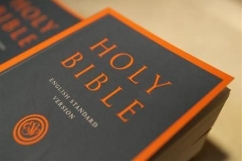
Recent analysis of pottery fragments by researchers at Tel Aviv University caused a spate of headlines along the lines of "The Bible is much older than we thought."
The researchers claim the discovery that inscriptions, dated to around 600 BCE, were written by at least six different authors indicates literacy was more common than previously recognised.
"In other words, the entire army apparatus, from high-ranking officials to humble vice-quartermasters of small desert outposts, was literate," the study concluded.
"The results indicate that in this remote fort literacy had spread throughout the military hierarchy, down to the quartermaster and probably even below that rank. This implies that an educational infrastructure that could support the composition of literary texts in Judah already existed before the destruction of the first Temple."
Essentially the study says literacy was widespread earlier than originally thought so the Bible could have been written earlier than had been thought until now. No new evidence from biblical texts themselves can verify this claim and some commentators think the evidence doesn't support such a sweeping conclusion.
But just how old do we think the Bible is?
Dating the New Testament is relatively uncontroversial and nearly all scholars agree the texts were completed by somewhere in the mid second century.
Similarly the dating of most of the prophets is relatively straightforward. Most scholars would agree books such as Jeremiah, Ezekial and Isaiah were written around the time of the fall of Jerusalem and the immediate aftermath. There are different views on the precise datings of the prophet writings and to what extent they were revised in later centuries. There are also numerous questions that surroud whether David wrote the Psalms attributed to him and whether Solomon wrote Proverbs and Ecclesiastes. But none of these arguments are particularly controversial. Although some Christians find the thought of challenging traditional understandings of authorship uncomfortable, there is no reason it should be.
What is more challenging is the dating of the first five books of the Bible, known as the Pentateuch. Tradition has held Moses wrote Genesis – Deuteronomy and points to biblical references such as "the book of Moses" (Mk 12.26) and "the law of Moses, which he had written" (Josh 8.32) to support this belief.
Conservative theologians have tended to hold to this tradition, although the academic consensus is against them.
In the 19<sup>th century a theory known as the documentary theory arose which posited the Pentateuch was compiled from around four different sources. This school of thought suggests Moses was not the author. Rather the texts were a collection of different traditions put together after the Jews returned from exile as they sought to understand their own history and identity. This means the texts would have been compiled around the fourth to fifth century BCE.
Some commentators have suggested the Mosaic tradition is making a comeback in academic schools although there is little evidence to support this.
It is important to stress that one can be a Christian and a firm believer in biblical authority without holding to the view Moses wrote the Pentateuch. We do not know who wrote Job, Hebrews or many other books in both the New and Old Testaments. That does not mean the lack of obvious authorship means a lack of inspiration. The same is true for Genesis to Deuteronomy. Just because we may not be sure Moses wrote those texts, it does not mean we cannot believe God speaks to us through them.
But which theory you decide to hold on to will determine how old you think the biblical texts are. Moses is believed to have lived sometime around 1,300 BCE so if you hold to Mosaic authorship, the first five books of the Bible would have originated from somewhere around this time.

If however you think the documentary theory is more reasonable, the Pentateuch would have been compiled around the fourth or fifth century BCE. It is important to remember that even though the documentary theory suggests the texts were compiled and written down around this time, they originated from oral traditions dating back much earlier.
So how old is the Bible? It depends who you think wrote the Pentateuch. If you think it is Moses, these particular texts are over 3,000 years old. If you think the Pentateuch was put together later on, the texts are probably around 2,500 years old along with the prophets' writings.
Despite this the Old Testament as a collection was not put together until much later. Scholars differ on when the texts were placed together as a canon but common suggestions put it around the second or third century BCE.
Your own understanding of who wrote the texts will influence how old you think they are. Neither position makes one a better Christian. In fact scholars will debate the datings and authors of texts until the end of time. What is far more important is how the texts are used and applied to influence are lives today.

















